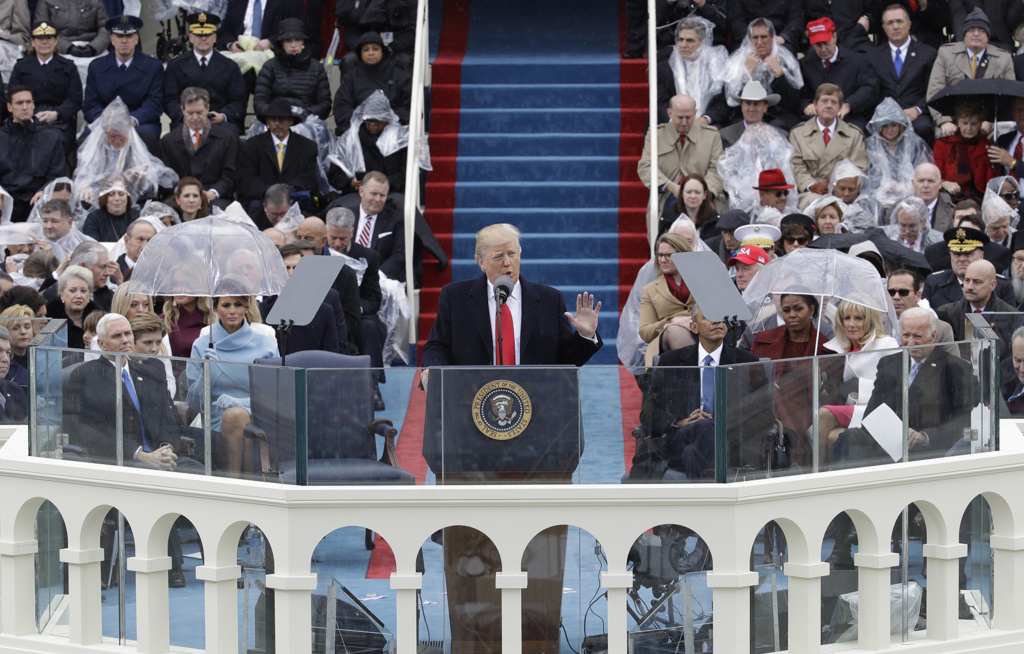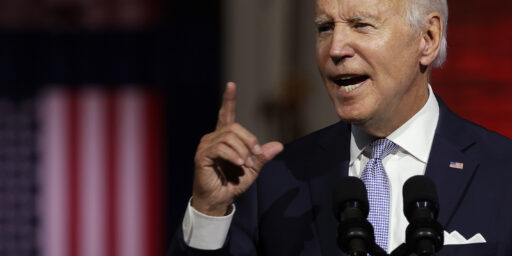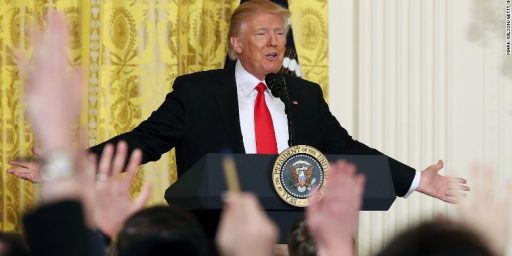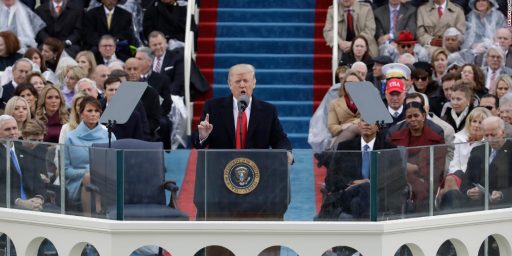Despite Donald Trump, America’s Institutions Are Prevailing
It's been a rough two years under Trump, but America's institutions are surviving.

Writing in The New York Times, Nicholas Kristoff seeks to assuage the worries of many that the Trump Presidency is some kind of existential threat to American democracy:
In his testimony before Congress last week, Michael Cohen in effect warned of a coup:
“Given my experience working for Mr. Trump, I fear that if he loses the election in 2020 that there will never be a peaceful transition of power,” Cohen said.
That fit neatly into the concern in some liberal circles that President Trump may not simply undermine democracy but actually overturn it. References to the Nazi takeover of Germany have proliferated, and cautionary tales about fascism are now ubiquitous, including Madeleine Albright’s “Fascism: A Warning.”
The polarization also leads Trump supporters to worry about a coup — by the “deep state” against Trump — and some make glib references about resorting to violence.
“We are in a civil war in this country,” Joseph diGenova, a prominent conservative commentator on Fox News and other programs, toldLaura Ingraham in her podcast. He added, “As I say to my friends, I do two things — I vote and I buy guns.”
Let’s all take a deep breath.
I think Representative Adam Schiff, the California Democrat who leads the House Intelligence Committee, has a point when he says: “This is a moment of great peril for our democracy.” But just past the midpoint of the Trump presidency (I hope!), it’s worth examining how the country has weathered the challenge — and my take-away is that American institutions and norms have shown impressive strength and resilience.
(…)
The best book warning of authoritarianism is, for my money, “How Democracies Die,” by Steven Levitsky and Daniel Ziblatt, both professors of government at Harvard. It’s a brilliant book, wise and nuanced, so I reached out to the authors and asked how they think the U.S. has done so far in the Trump presidency.
“The U.S. is not 1930s Germany or contemporary Hungary, Venezuela, or Turkey,” Levitsky told me. “The U.S. has much stronger democratic institutions than these countries, and it has a much stronger opposition. So whereas in Hungary and Venezuela autocrats steamrolled weak oppositions, Trump faced pushback on multiple fronts, including, very importantly, the electoral front in November 2018. So, yes, U.S. democracy is hard to kill.”
Still, Levitsky and Ziblatt caution that an underlying polarization and erosion of norms made Trump’s election possible, and they persist. Moreover, while the Democratic victory in the House is good news for accountability, it also results in a divided government that can’t get anything done.
“U.S. democracy is sliding into dysfunction,” Levitsky said, noting that this can increase the appeal of other demagogues. Republican leaders like Mitch McConnell have also refused to stand up to Trump and have allowed certain authoritarian values to infect a wing of the party. Almost a quarter of Republicans said in a poll last year that “President Trump should close down mainstream news outlets, like CNN, The Washington Post and The New York Times.”
So there’s plenty to worry about, but let’s acknowledge that the American system so far has shown itself resilient. In my more hopeful moments, I think that we are seeing a backlash to Trumpian authoritarianism that may ultimately strengthen the rule of law, as happened after Watergate.
For those still wringing their hands and unconvinced, here’s my bottom-line reassurance: Trump won’t manage a coup, and he seems to me more likely to end up a felon than a president for life.
I made a similar argument when this circus began on Inauguration Day 2017 after what was perhaps the most divisive Inaugural Address ever:
The ascension of Donald Trump to the Presidency differs from many in the past, of course. While every new President enters office with some degree of opposition, Trump enters office with some of the lowest approval ratings of any new President in the modern era. Additionally, his rhetoric over the course of eighteen months of regarding minorities, women, the media, and his political opponents has many people concerned about what the next four years or longer may bring. As is often typical in these cases, there are those who are predicting and fearing the worst about the new President, and as my own writing over the past several years about Trump should make clear, I share many of those concerns. While campaigning for President, Donald Trump consciously appealed to the worst aspects of American politics and used the rhetoric of populism, nationalism, and division for political gain in a manner unseen since the 1968 campaign of the late Alabama Governor George Wallace. His rhetoric also mirrored that of others in American history who appealed that combination of bigotry and populism that has sadly played all too well in American politics from the days of the 19th Century Know Nothing Party, to the predatory populism of William Jennings Bryan, to the divisive rhetoric of men who rose up during the Great Depression since as Huey Long and Father Charles Coughlin. As I said immediately before Election Day, all of this led me to the conclusion that Trump was a unique enough danger that he needed to be stopped at all costs.
Unfortunately, that isn’t how the election turned out, and while Hillary Clinton did win more popular votes, it was Donald Trump who walked away with the win in the Electoral College that made him the 45th President of the United States today. Since Election Night, there has been much rhetoric on both sides of the aisle about what it all means and where the nation is headed. For Donald Trump’s supporters, his victory and today’s events represent a win over the forces of an establishment that has had its hold on Washington for far too long. For his opponents, they represent a victory for the forces of division, and many of those opponents have spent the two months since Election Day predicting nothing but doom and gloom for the nation. While I remain as concerned as I was before the election regarding what Trump represents, though, I’d caution against panic mongering and fear at this point. Over the past
Our nation has faced many challenges over the past 228 years, including a war that divided the nation and threatened to destroy it even before it turned one hundred years old. It has faced dangers from overseas, including a war that was fought on two fronts and involved millions of deaths and casualties, and a quieter Cold War that threatened to unleash forces of destruction capable of making the planet essentially uninhabitable for hundreds of years. It has endured scandals and corruption in all three branches of government, racial, ethnic, and gender-based prejudice, and political polarization that was, as hard as it might be to believe, even worse than what we are dealing today. It has faced economic downturns that forced millions of people out of work and into seeming hopelessness, natural disasters, and political assassinations. Through it all the nation has survived, and it will survive Donald John Trump no matter how long he ends up serving as President of the United States.
None of this is to say that we shouldn’t stand up and speak out when the new President does something we disagree with, of course. As Thomas Jefferson put it, “eternal vigilance is the price of liberty,” and that means it is the responsibility of each of us to speak out and to act within the system when our leaders are headed down the wrong path. I fully expect that I will be critical of President Trump far more than I will be accepting of the policies he will advocate in the coming years. Of course, that was true of the man who just left the Presidency and the man before him as well, so that’s hardly a change. At the same time, though, I’m going to try to remember that America will survive this just as it survived everything else we’ve faced over the past two centuries. The damage that is done, though, will depend largely on how vigilant men and women of conscience on both sides of the aisle are and whether they’re willing to speak out when necessary. Donald Trump is our President, words that still astound me even as I type them, but he isn’t our King and he isn’t President for life. So remain vigilant, and try not to be too melodramatic about the future no matter how tempting it might be.
As we sit here 779 days later, I continue to believe what I wrote on that cold January day two years ago. While Donald Trump has tested our institutions to a far greater extent than any other President with the possible exception of Richard Nixon, those institutions remain in place and they remain strong. Over the past two years, for example, the Courts have proven themselves to be a bulwark notwithstanding the fact that this Administration and this President have attacked Judges and the Rule of Law openly. On issues ranging from the Muslim Travel Ban and the effort to repeal the DACA program to the ban on transgender soldiers serving openly in the military the Administration’s efforts to stop cities and localities from becoming so-called “sanctuary cities,” the Administration’s treatment of children and migrant families seeking asylum, and the effort to add a question regarding citizenship to the 2020 Census, the Courts have proven to be a significant check on the ability of the President to make end runs around the Congress and the Constitution to get what he wants. Most recently, there have been a number of lawsuits filed by several states and independent groups regarding the President’s declaration of a national emergency to help pay for his border wall. That list is likely to expand in the future notwithstanding the fact that the Trump Administration is slowly but surely remaking the judiciary. Indeed, several of the Judges who have ruled against the Administration on these issues have been Judges recently installed by President Trump. While some of the holdings in these cases have been overturned or limited on appeal, the fact that the courts have pushed back on Administration policies moves so aggressively is both a sign of hope that at least part of the ‘checks and balances” that the Constitution put in place are still working and a sign of just how much this Administration is acting in an extra-legal and extra-Constitutional manner.
In addition to the judiciary, Trump has also unleashed unrelenting attacks on the Rule of Law, especially on the efforts to investigate himself, his campaign, and his business associates. Notwithstanding the fact that the President regularly refers to it as “witch hunt,” the investigation being conducted by Special Counsel Robert Mueller into Russian interference in the 2016 campaign, allegations of collusion between the Trump campaign and Russia, and allegations that the President has obstructed justice in an effort to thwart that investigation. In addition, the U.S. Attorney for the Southern District of New York and the New York Attorney General are conducting their own investigations of the President’s business operations and his charitable foundation that, in the end, could prove to be more problematic for than anything Robert Mueller is doing. Whether anything comes of all this remains to be seen, but, again, our institutions are working the way they are supposed to.
Admittedly, one cannot exactly say the same things about the Legislative Branch of government. During the two years that the Republicans controlled the House, Senate, and the Presidency, Congress essentially ceded its authority and Constitutional responsibility to oversee the operations of the Executive Branch and became little more than a rubber stamp and a cheering section for a President who thought nothing about violating political norms on a regular basis. Actions that would have provoked outrage had they been undertaken by a Democrat were cheered by Republicans on Capitol Hill and by the rank and file of the party. To be sure, there were some exceptions to that rule, but they could largely be counted on one hand and none of them were able to convince their fellow Republicans to join them in speaking out against Trump even when doing so would seem to be the only proper thing to do. At the same time, though, it’s worth noting that all that changed in November 2018 when the voters got the first chance to speak since the 2016 election, and they did so by handing Democrats their biggest midterm victory since the 1974 post-Watergate election and control of the House of Representatives. We”re just two months into that control, and we’ve already seen signs that this is going to result in a far different world for the Administration in which they are going to be called to task for things that Republicans spent two years ignoring. In that sense, again, our institutions worked the way they were supposed to.
Outside the government, the Trump years have seen an unrelenting assault on the media from the White House that is, again, unlike anything we’ve seen before. Both during the 2016 campaign and since taking office, the President has used his Twitter feed and campaign rally speeches to attack the media, referring to them as “Fake News” and the “enemy of the people,” a phrase that originated with none other than Joseph Stalin. Despite these unrelenting attacks, and the efforts of the Administration to close off media access through methods such as essentially eliminating the Daily Press Briefing, the media has, for the most part, stood out and stood up to Trump by continuing to report what the Administration is doing, the lies it is telling, and the impact that it is having on the nation’s institutions, culture, and politics. Admittedly there have been errors along the way, but those errors have corrected when caught. While the Fourth Estate has not been perfect over the past two years, it has done a generally good job of keeping the public informed about what the Administration is doing. What the public does with that information is up to them.
Taking all this into account, it strikes me that much of the gloom and doom that many Trump critics have expressed is overwrought to some degree. Yes, Donald Trump has had a corrosive effect on government, politics, international relations, and our culture, but we’ve managed to make it this far with the institutions still intact. Something tells me we’ll make it through whatever time is left in Trump’s hold on power.






We’re past the halfway point and a lot of us are just counting down the 683 days left until the new president is sworn in.
I think something needs to be fixed here
Were Trump’s support down to any extent, I might agree. This cancer in the body politic is no less strong, and will have at least another two years to dig in deeper.
I will grant that Trump was elected partially as an anti-Institutionalist, but decimatimg the Treasury Department and annihilating the State Department seems really counter-productive.
I’ve grokked onto the trait that animates Trump’s hatred and that is criticism.
Trump cannot abide criticism however mild or productive.
This was an astounding piece. Just look at this:
You’ve become a really good writer – you pulled together so many seemingly disparate threads into a coherent and compelling narrative. Kudos!
And, he and McConnell are packing the courts with lifetime appointments at a record rate, after years of blocking Obama’s nominees.
I think it’s too early to say that American institutions are holding up. The damage will,continue for decades. Trump might not manage the killing blow, but he’s making it a lot easier.
@Gustopher:
Good point. I had not thought about the courts.
America will easily outlive and forget Trump, but his cancerous legacy will live on for decades. This is why you shouldn’t elect R Presidents, just sayin’.
I don’t think we’re facing a coup, but that’s more down to Trump’s incompetence than anything else. I have no doubt a good third of Americans would think it was a swell idea.
The catastrophe in 2016 was not Trump, it was that 46% of Americans who voted are either so vile or so stupid they defiled the White House and seriously weakened the United States. I mean, if you hire a baboon to pilot your airplane it’s not the baboon’s fault when the plane crashes.
The American people have a serious problem. They put a corrupt, stupid, rancid POS in the White House and allowed Congress to abdicate, and in the end it is those two institutions that define the courts going forward. Democracy cannot be saved from the people.
I don’t remember anybody complaining about Obama going after Samuel Alito.
@Eric Florack:
Then you have a troubling memory problem, because it was a super big deal that you’ve conveniently forgotten for some unexplained reason. I could refer you to a neurologist if you wanted.
@Eric Florack:
Funny, I remember you raging on this and many other aspects of Obama. Strangely you’ve come to appreciate how Trump turns all those same issues up to 11.
@Teve: That’s one of those introductory clauses that becomes so long that the writer loses his place (??) and just ends the sentence without getting to the main clause. It’s more common in blogging–where speed is the key to productivity (and therefore profit) than I’d like to see, but the phenomenon seems baked into the medium. I posted on this a few weeks ago. Nice to see a concrete example, I was too lazy to look one up at the time.
@de stijl:
I undersold this:
Trump can’t stand to be criticized even slightly. He goes bonkers and then tweets about it.
Don’t go for the lookish bits like pudginess or hair. Way too obvious. He’s 72, he can be as pudgy as he wants to be. And, yes, his hair is ludicrous, but he’s been doing that extreme comb-over for decades. His fingers are relatively short for his height, but move on from that.
Criticize him on the merits and call out his deficiencies at “presidenting”.
@Teve:
@Just nutha ignint cracker:
Where’s the verb? Ack!
It’s like one of those German sentences that go on forever with nouns and the whole background story and then eventually gets to the verb / predicate at the very end. Only, there’s no verb. He ended that with a period.
Also, overuse of “notwithstanding” throughout unless that was an intended motif.
My OCD is kicking in.
I rescind my praise. Kinda, he did really pull together multiple threads into a coherent stream with the bit I blockquoted earlier.
I had to read it three or four times because I haven’t been braining too good today.
@Teve:
Skip Proust and just lie about it if anyone calls you on it.
Run-on sentences for days about feels. And some bit about Madeline who is either a person or perhaps a pastry. It’s unclear in the text.
@de stijl: she/it smelled good though. Like childhood… 😀
And look, Eric, now we see that Obama’s statement was correct (and also that your definition of “going after Alito” is pretty….snowflakey, considering the criticism Trump has leveled at members of the judiciary). Citizen’s United HAS opened the floodgates of dark money and corruption into our electoral process.
The whataboutism is so tiresome. No criticism of Trump, no matter how legitimate, can be let go without a “Well, what about Obama doing this, or Clinton doing this?” Get over it, Obama is no longer President, and had he tried to do even 1/10 of the crap Trump has pulled, you guys would’ve immediately started impeachment hearings. Totally A-OK with Trump doing it, “owning the libz” and all (insert 65 million eyerolls here). And Hillary lost, so get over that, too. It’s really quite unfortunate, I doubt our debt/deficit numbers would be so high under President Clinton. Our allies would still trust us. Health insurance might be better. I mean, I can go on and on about all the things that might’ve been better with President Clinton, now that we’re two years into Trump.
@Teve:
I LOLd. Literally. I laughed out loud. About Remembrance Of Things Past aka In Search Of Lost Time of all things.
Has anyone actually read all of Proust. God – that was awful. The utter despair of actually reading Proust probably invented Cliff’s Notes. I was a good student and read all of it (the first book which was the assignment) and gleaned not one goddamned thing. Maybe there is something there but I was just too overwhelmed and bored to see it.
@de stijl:
Hahaha 🙂 🙂 🙂
20 something years ago a very good friend of mine who was a librarian showed me how he was reading it, and I think it’s the correct way to do it. You get each book, or the whole set, whichever you feel like doing. And you get on a schedule. Nothing big, no big bulk sessions. In his case, he read it either three or four pages a night. And that was it. Strictly. Don’t do anymore, or you’ll burn out, and also you won’t savor it. Sure, it’ll take years to complete, but if you try to do it much faster you’ll crash and burn like I did the first time, or maybe the first two times.
In my 42 years on the planet, that’s the first time I’ve ever made anybody laugh with a Proust joke. 🙂
I read lots of things, too much really, but I’m a very slow reader. It took me like 3 months to get through the latest Carl Zimmer book. I’m caught up in the New Yorker through December, I’ve had Midnight’s children sitting on my floor next to the couch for like 6 months now without cracking it once, and I’m 4 issues behind on vanity Fair and 3 on Wired 🙁
I make library payments like some people make car payments.
@de stijl: I can’t fault him on verbs. I counted 4 and can explain 2 more that might be considered gerunds (so they would be called nouns). What’s missing is a predicate for the short subject “the investigation being conducted[verb] by Special Counsel Robert Mueller.”
ETA: And you’re right about the passage you praised. Very good writing! Powerful, even through the complexity of the multiple topics!
@de stijl: If it helps, the pastry is a madeleine. I’m not enough of a lit guy to read Proust in translation and my French is too out of practice to read for the “linguistic effect” in the original language.
@Just nutha ignint cracker:
I swear to Baal you’re wrong. Madeline was a curvy space princess maybe green but there’s no shame in that, and pirates, and an antagonist too. Ah – the evil chef who bakes tasty pastries but none for you! You’re the chosen one defending your simple farming and or fishing village from tyranny and evilness by deeds of dering do. You’re also curious about this baking thing. Perhaps too curious.
That is my recollection of Remembrance Of Things Past. Fight me.
@Teve:
Read on, you magnificent bastard!
—–
Reminds me of my favorite line from Patton. George C. Scott yelling “Rommel, you magnificent bastard I read your book. I read your goddamned book!”
Karl Malden has to be the schlubbiest guy ever to get full billing on a movie. Good on Karl.
Maybe Gene Hackman in The Conversation?
That was a really good movie.
Oh – and John Cazale. That guy was bonkers genius.
@Just nutha ignint cracker:
That utterly escaped me. Thanks for the pro-tip, Captain Obviously Not In On The Joke.
@de stijl: Cazale was such a schmuck in Dog Day Afternoon. I think he became an archetype.
Was Cazale Method? Man, it was a shame he died so young.
John Cazale was in five movies in his whole career, and all of them were nominated for Best Picture. That’s crazy.
I really need to watch The Deerhunter again soon.
In The Deerhunter – the first act is so strange. It’s like going to church and you’re no longer in control you just have to passively let what will happen happen and just watch.
And then Meryl Streep and Christopher Walken. Streep was so heartbreaking and honest in her scenes and Walken was so … creepy – not the correct word, maybe haunting.”Haunting” will have to do.
Wow! Wow! Wow!
If you’ve not seen The Deerhunter watch it. No fooling – it is great.
And The Godfather. And Dog Day Afternoon. And The Conversation. And just make it a John Cazale themed weekend.
@de stijl:
Ah! Finally my brain kicked in.
Ernest Borgnine in Marty. His sclubbiness / relative attractiveness was essential to the plot.
I hear that in hockey when a brawl breaks out, the players more heavily penalized are not those who start a fight, but those who join in. This makes perfect sense, as a fight is a small thing, while a brawl is pretty big.
That’s how it goes with norm-breaking. the problem isn’t so much the person or people who start breaking norms, but those who join in. And this is why I urge Democrats not to try to outdo el Cheeto in this regard.
To go to my all-time favorite example of Tiberius Gracchus, the Troublesome Tribune. He didn’t start breaking the norms, his political enemies did when they vetoed the reading of a bill so it wouldn’t be voted on. But he joined in by removing the Tribune who issued the veto, and later on by trying to engage in foreign policy.
One can argue Trump didn’t even start, but that he joined in and the avalanche has already started. one can point to McConnell refusing to schedule a confirmation hearing for Judge Garland, and even earlier examples.
I grant this is a bit more complicated than a hockey brawl, as some norms become outdated and should be broken. and it’s far easier to agree your side’s norm breaking is a necessary response to outdated norms which have become harmful, while the other side’s norm breaking is a breakdown of civility and order.
the Steele dossier suggested that some Trump insiders weren’t entirely unhappy with the media’s focus on Russia, because that was distracting them from even more corrupt dealings Trump had with China.
In light of that, this is interesting:
The massage parlor owner peddling access to Trump and his family is an officer of two groups with ties to China’s communist government
@de stijl: What can I say? The comment handle says it all.